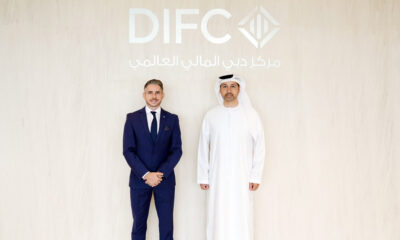News
Dubai Startup Silkhaus Aims For A “Smooth As Silk” Experience
Technology now plays a key role in the Dubai rentals market, helping real estate investors and travelers alike to create unique hospitality experiences.

Dubai-based Silkhaus is a PropTech startup that describes itself as a “technology-first hospitality brand”. The company aims to offer immersive nomadic experiences by “providing business and leisure travelers with a home away from home” and, as the name suggests, convert tedious planning into an experience that’s as smooth as silk.
For readers unfamiliar with the term, PropTech is the application of technology in the real estate sector. It encompasses everything from property management and Airbnb-style bookings to construction and analytics, with features usually accessed through a mobile app.
The global PropTech market value is projected to grow from $18.2 to $86.5 billion by 2032 — a compound annual rate of about 17% — and is primarily driven by nomadic professionals who are happy to relocate for career purposes.
As for Silkhaus, the startup was conceived by strategy consultant Aahan Bhojani, who noticed several issues with his own corporate travel experiences. He now strives to ensure others won’t experience the same frustrations.

“I realized there was something broken about the long-stay travel experience, and finding suitable long-term accommodation options on online travel aggregators was like pulling a needle out of a haystack […] aside from investors purchasing real estate, we have seen a growing interest in the resident population seeking to reside in the UAE. The need for a ‘landing pad’ to accommodate incoming audiences has never been stronger,” says Aahan Bhojani, founder and CEO of Silkhaus.
Also Read: Hotel Cloud Kitchen Startup Matbakhi Launches In Saudi Arabia
Despite a gradually worsening global market, Silkhaus was still able to raise $7.75 million in a seed funding round last month, and is well placed to boost its portfolio of investors and continue with a medium-term expansion strategy.
Over the last few years, big data and cloud technology have transformed consumer experiences in the property sector, positively affecting property owners, tenants, landlords, and brokers alike. Startups like Silkhaus look set to continue this trend, with plans in the works to expand to cities across the Middle East and eventually into South and South-East Asia.
News
Rabbit Expands Hyperlocal Delivery Service In Saudi Arabia
The e-commerce startup is aiming to tap into the Kingdom’s underdeveloped e-grocery sector with a tech-first, locally rooted strategy.

Rabbit, an Egyptian-born hyperlocal e-commerce startup, is expanding into the Saudi Arabian market, setting its sights on delivering 20 million items across major cities by 2026.
The company, founded in 2021, is already operational in the Kingdom, with its regional headquarters now open in Riyadh and an established network of strategically located fulfillment centers — commonly known as “dark stores” — across the capital.
The timing is strategic: Saudi Arabia’s online grocery transactions currently sit at 1.3%, notably behind the UAE (5.3%) and the United States (4.8%). With the Kingdom’s food and grocery market estimated at $60 billion, even a modest increase in online adoption could create a multi-billion-dollar opportunity.
Rabbit also sees a clear alignment between its business goals and Saudi Arabia’s Vision 2030, which aims to boost retail sector innovation, support small and medium-sized enterprises, attract foreign investment, and develop a robust digital economy.
The company’s e-commerce model is based on speed and efficiency. Delivery of anything from groceries and snacks to cosmetics and household staples is promised in 20 minutes or less, facilitated by a tightly optimized logistics system — a crucial component in a sector where profit margins and delivery expectations are razor-thin.
Despite the challenges, Rabbit has already found its stride in Egypt. In just over three years, the app has been used by 1.4 million customers to deliver more than 40 million items. Revenue has surged, growing more than eightfold in the past two years alone.
Also Read: Top E-Commerce Websites In The Middle East In 2025
CEO and Co-Founder Ahmad Yousry commented: “We are delighted to announce Rabbit’s expansion into the Kingdom. We pride ourselves on being a hyperlocal company, bringing our bleeding-edge tech and experience to transform the grocery shopping experience for Saudi households, and delivering the best products – especially local favorites, in just 20 minutes”.
The company’s growth strategy avoids the pitfalls of over-reliance on aggressive discounting. Instead, Rabbit leans on operational efficiency, customer retention, and smart scaling. The approach is paying off, having already attracted major investment from the likes of Lorax Capital Partners, Global Ventures, Raed Ventures, and Beltone Venture Capital, alongside earlier investors such as Global Founders Capital, Goodwater Capital, and Hub71.


























